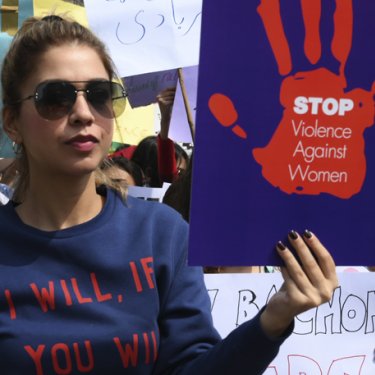Pakistani government-orchestrated cyber-harassment of women journalists

In response to a joint statement by a group of Pakistani women journalists denouncing a cyber-harassment campaign against them by government officials and supporters, Reporters Without Borders (RSF) calls on the Pakistani authorities to ensure that the online threats and hate messages are stopped.
Issued by 20 women journalists on 12 August (when it was retweeted by RSF) and now carrying around 50 signatures, the statement condemns a “well-defined and coordinated campaign” of social media attacks on women journalists and commentators whose views and reporting have been critical of the government and “more specifically its handling of the coronavirus pandemic.”
“Women journalists are an easy target to harass online,” said Shehar Bano, the editor of The News International newspaper and vice-president of the Pakistan Federal Union of Journalists. “And these are not ordinary people harassing you. These are people who know you. These people have political support.”
Sexist harassment, insults and rape threats
“I don’t tweet much, but as soon as you tweet something, the trolls begin trying to silence you,” said Asma Shirazi, a political journalist with Aaj News TV and recipient of the Peter Mackler Award for Courageous and Ethical Journalism in 2014. “Gender-based harassment, rape threats and abusive language are among the serious threats that women journalists face in Pakistan.”
The online harassment is so violent that it succeeds in silencing some women journalists.
“My close relatives don’t follow me on social media to avoid having to see the abusive language these online trolls use in an attempt to silence me,” Shirazi said. “My mother even asked me to quit journalism.”
Geo News TV reporter Benazir Shah said the social media harassment usually follows a very specific pattern. “First government officials target you, calling your tweet ‘fake news’ or accusing you of being an ‘enemy of the people’ or a ‘lifafa’ journalist (one who takes bribes),” she said.
“Then, after the official harassment, you are bombarded with abusive language by other people displaying the ruling Pakistan Tehreek-e-Insaf party flag or Prime Minister Imran Khan’s photo on their Twitter accounts.”
Government responsibility
“We regard the highest levels of the Pakistani government as either responsible or complicit in these recent cyber-harassment campaigns against certain women journalists who don’t toe the official line,” said Daniel Bastard, the head of RSF’s Asia-Pacific desk.
“This tactic, which clearly aims to intimidate all government critics, is a flagrant violation of article 19A of the Islamic Republic of Pakistan’s constitution. We call on Prime Minister Imran Khan to ensure that this unacceptable use of hate speech is brought to a stop.”
Shah, a recipient of the UN Correspondents Association’s excellence in journalism award in 2013, said: “No government minister or any other official has approached us since we released the joint statement. On the contrary, the harassment increased after the statement’s release. Women journalists are very distressed. They feel helpless to stand up to the online harassment.”
The day the joint statement was released, RSF published a special report on the brutal murder of Arooj Iqbal, who wanted to be the first woman journalist to launch her own newspaper in Pakistan and who will go down in history as the first Pakistani woman to be shot dead because of her journalism.
Pakistan is ranked 145th out of 180 countries in RSF's 2020 World Press Freedom Index.


